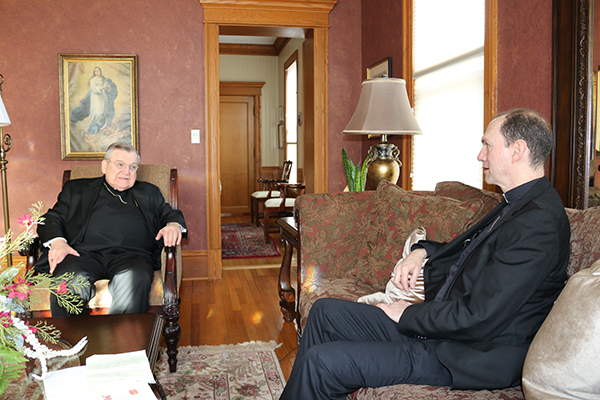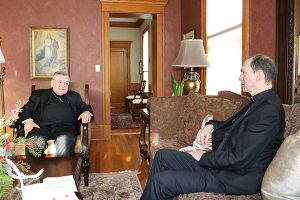A Conversation With Cardinal Burke

Catholic Entrepreneur Offers Advice to College Graduates
May 5, 2018
Prayer Service Held in US Capitol Urges ‘Unity’ Across Denominational, Racial Lines
May 5, 2018
Photo: His Eminence Raymond Cardinal Burke and Bishop John Folda converse in Bishop Folda’s residence. (Paul Braun | New Earth)
By Paul Braun, Diocese of Fargo,
Raymond Cardinal Burke, archbishop and the patron of the Sovereign Military Order of Malta, and past Prefect and current member of the Apostolic Signatura, was in Fargo on April 17-18 to attend the La Bella Serata Gala at the Delta Hotels by Marriott. Cardinal Burke is a former Bishop of Lacrosse, Wis, and Archbishop of St. Louis, Mo. New Earth had an opportunity to talk to Cardinal Burke about the challenges facing rural parishes, the state of the Church in the United States, and other items of interest to the faithful.
 His Eminence Raymond Cardinal Burke stands in the chapel at Bishop Folda’s residence in Fargo. (Paul Braun | New Earth)
His Eminence Raymond Cardinal Burke stands in the chapel at Bishop Folda’s residence in Fargo. (Paul Braun | New Earth)
The Fargo Diocese is a mission diocese, with most of our parishes in small, rural communities. You were raised in rural Wisconsin, and know what it’s like to live and work in these communities. How crucial are the rural parishes to these communities and the Church as a whole?
Cardinal Burke – The rural communities are critical. The farmers are working with creation, with plants and animals to produce food, fiber clothing for everyone. They’re working directly with God. Farmers helps us to keep a sense of who we are and where we come from. They help us to have a strong faith in God’s presence. They realize they depend totally upon God, so a good farmer is also a person of deep prayer, asking for God’s help and for the intercession of Our Lady, the angels and saints, especially St. Isidore and his wife St. Maria, who are the patron saints of farmers, especially family farmers.
The rural life movement, which was very strong in our country, especially in the earlier part of the 20th century, was very much connected with the liturgical movement, with the intention to enhance peoples’ life, prayer, and devotion, and their understanding and participation in the sacred liturgy. It is also connected with the development of Catholic Charities and foundations of social works in the Church and their development in this country because the rural community was seen to be at the very heart and life of the people. So, the farmers certainly bring a tremendous contribution to the life of the church in the sense of helping everyone to be more connected with nature as God created it. Of course, the farmers also look to the Church for the intercession they need in order to carry out their work. Today there is a challenge in farming which didn’t exist in the past; so-called vertical integration. There are a number of practices that are used with these very large farming operations and larger animal concentrations that raise moral questions about the soundness of the method of producing the food. Farmers have an added challenge today.
The Church needs to be very close to farmers. I was bishop in LaCrosse, and it used to be heavily populated with small farmers. Now the small farmers are disappearing, and the ones who can survive now are the ones who do organic farming, because they’re able to receive a price for their produce which earns them a living, whereas the other small farmers can’t because of this vertical integration, these huge operations, because they control the production, the processing, the selling, and therefore the food is cheap, but so is the return small farmers are receiving. I tried my best to be close to the farmers, especially the small farmers, because many of them became discouraged, especially when the farm had been in the family for generations and now suddenly the farmer finds that in his or her time everything is going financially to ruin, and they have to give up the farm. That’s a very heavy burden, and actually something that’s not known very widely is the incidence of suicide among farmers, which should be a very profound concern for the Church. So, the Church needs to be very close to farmers and to encourage them, especially to know the moral challenges and economic challenges that they face.
NE – In a larger community like Fargo or Grand Forks, if some families stop going to Church, there are still many others that do take part and help sustain those parishes. That’s not the case in our rural communities. When the younger families leave, it is devastating. How do we reach out to those younger families and bring them back to our parishes?
Cardinal Burke – It is devastating. I saw this repeatedly in my home diocese. There were all of these wonderful little parishes where there were a good number of family farms surrounding them, and these farmers would have a number of children. Now the farms are being sold to these big companies who often times bring in workers from outside the community who are kind of anonymous. I remember one time I visited one of these huge dairy operations in Wisconsin, and I met these workers from all over the globe, and afterwards I asked some of the people in the small town nearby if they were coming to church and they said “We didn’t even know they were there.” It’s a different kind of situation spiritually. So now the parish numbers go down to a certain point, and what’s the local Bishop to do? The parish can’t sustain itself anymore, and the parishes have to be grouped together sometimes, or some have to be closed, and that’s always sad because people have long family ties to these parishes. Their parents, grandparents and themselves have received the sacraments there, some are buried there, and for them now to think there won’t be a parish there anymore is a terrible thing. As a bishop, it was one of the worst situations I had to deal with, these small, formally vibrant community parishes not being able to continue.
NE – So how do we reach out to these peripheries? How do we bring those former Catholics back in?

His Eminence Raymond Cardinal Burke and Bishop John Folda converse in Bishop Folda’s residence. (Paul Braun | New Earth)




